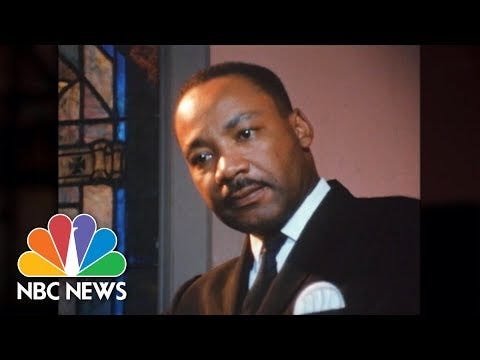Memory and Dr. Martin Luther King, Jr. - Issue #17
Thank You For Supporting Our Work
Before we get started down the trail of digesting much needed information, I just want to say Happy New Year! I want to thank you, each one of you, for reading The Intersection's content. Thank you for supporting this work. Now on to the reading.
How We Remember Matters
On Martin Luther King, Jr. Day, politicians and non-politicians flood the Internet with pictures of Dr. Martin Luther King, Jr., his words, and edited videos of him talking about voting, participation in America, and of him protesting. These are some people's attempts to genuinely honor the life and service of Dr. King. That is, they want to remember King the way he talked about himself, his political philosophy, his love for Black people and all humans, his unwillingness to stay the course, even when he was getting death threats. However, some use this time, again and again, to flood the internet with misinformation about King, and his legacy.
America's remembrance of King, Coretta, and others is one that freezes them in time, which rarely allows for a memory of the Civil Rights Movement past 1695. Additionally, King is regularly talked about as if he was the only leader of that era's Civil Rights Movement. There were many leaders in the Civil Rights Movement, including Black women. Dr. King didn't start the Civil Rights Movement. King and others carried on the Black tradition of anti-Black activism domestically and globally.
In this newsletter, we offer some resources that will help to move you beyond the "I Have A Dream Speech." Content on King will entail:
Dr. Bernice King, daughter of Dr. King and Coretta, continues her father's legacy of speaking truth to power by challenging the Biden administration to pass legislation on voting rights.
NBC interviewed Dr. King about his early years in the Civil Rights Movement. You want to listen to Dr. King in his own words.
Links to his speeches.
Martin Speaks
NBC interviewed Dr. King on May 8, 1967. In this video, King talks about a lot of things, especially how his views changed since the early years of the movement.
Here, King critiques the United States, white people, and sets out a vision of what he thinks is possible.
In the public sphere, Dr. King is rarely remembered as a preacher and pastor. King remained a preacher, even as he protested anti-Black violence. Here is King preaching a sermon.
Here is King talking about inequality in America. Here you get a sense of the depth of his knowledge, how he understood the time in which he lived, and his passion to teach Black activists, and their allies how to engage in local politics.
Here, King talks about voting, and what hindered Black people from voting in America. He is honest in assessment.
Coretta & Dr. King's Daughter Continues Their Legacy
Bernice, his daughter, and Martin Luther King III, his son, have carried on their father and mother's legacy of protesting and advocating for better living conditions for Black people, and others, in America and abroad.
Note: You should read this for context. https://fivethirtyeight.com/features/the-big-lie-voting-laws/


The King Center, led by Bernice, held the Beloved Community Global virtual Summit. Here is the first day. Ms. King also teaches non-violence.
Looking Back To Interpret The Present
Leading up to this day, journalists, academics, and scholars have been looking back on King's life, and the events surrounding him to tell this generation about what he accomplished; the political climate; how the FBI tracked his every move; infiltrated Black organizations to disrupt them; and how he was assassinated.
Award-winning director Sam Pollard released a film in 2020 on the FBI's disruptive interaction with Martin Luther King, Jr. and the civil rights movement.



